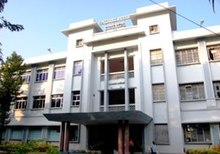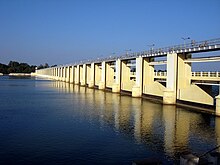Trichy District
During the British Raj, the district was referred to as Trichinopoly, and was a district of the Madras Presidency; it was renamed upon India's declaration of independence in 1947. The district is spread over an area of 4,404 square kilometres (1,700 sq mi) and had a population of 2,722,290 in 2011.
Geography

Tiruchirappalli district lies almost at the exact centre of Tamil Nadu. The district has an area of 4,404 square kilometres. It is bounded in the north by Salem district, Northwest by Namakkal district, in the Northeast by Perambalur District, East by Ariyalur district and Thanjavur District, in the southeast by Pudukkottai district and Sivagangai district, in the south by Madurai district, in the southwest by Dindigul district and, in the west by Karur district. The district shares its borders with 10 other districts, the highest for any district in the state. The Kaveri river flows through the length of the district and is the principal source of irrigation and drinking water.
Kolli Hills form the boundary of Tiruchirapalli and Namakkal districts and Pachaimalai Hills form the Boundary of Salem and Perambalur district with Tiruchirapalli district in the North and North East.
The North most and South most parts of the district are hilly, central part of the district is Kaveri plains. Trichy district is diverse in landscape, mixture of Fertile, Delta, Valleys, Hilly areas, Semi Arid Zones. Central part of the district is fertile due to river Kaveri flowing through this district, by splitting the district into North and South. North Central and South Central part of the district is Semi arid and drought prone area, receives less rainfall. Evergreen Pachaimalai Hills and Kolli Hills form the Stunning and Enchanting Valley in between these two hills. Falls and Streams from these two hills fills up the lakes in valley areas and makes the land irrigated and Fertile.
Pachaimalai Hills receives high rain fall than average during both Northeast Monsoon as well as Southwest Monsoon, which makes these hills Greener throughout the year and gives a cool climate.
Demographics
|
|
| |||||||||||||||||||||||||||||||||||||||||||||
| source: | |||||||||||||||||||||||||||||||||||||||||||||||
According to 2011 census, Tiruchirappalli district had a population of 2,722,290 with a sex-ratio of 1,013 females for every 1,000 males, much above the national average of 929. 49.15% of the population lives in urban areas. A total of 272,456 were under the age of six, constituting 139,946 males and 132,510 females. Scheduled Castes and Scheduled Tribes accounted for 17.14% and 0.67% of the population respectively. The average literacy of the district was 74.9%, compared to the national average of 72.99%. The district had a total of 698,404 households. There were a total of 1,213,979 workers, comprising 161,657 cultivators, 319,720 main agricultural labourers, 25,174 in house hold industries, 575,778 other workers, 131,650 marginal workers, 9,012 marginal cultivators, 59,062 marginal agricultural labourers, 5,212 marginal workers in household industries and 58,364 other marginal workers.
At the time of the 2011 census, 95.67% of the population spoke Tamil, 2.08% Telugu .
Politics
| District | No. | Constituency | Name | Party | Alliance | Remarks | ||
|---|---|---|---|---|---|---|---|---|
| Tiruchirappalli | 138 | Manapaarai | P. Abdul Samad | Dravida Munnetra Kazhagam (MMK) | SPA | |||
| 139 | Srirangam | M. Palaniyandi | Dravida Munnetra Kazhagam | SPA | ||||
| 140 | Tiruchirappalli (West) | K. N. Nehru | Dravida Munnetra Kazhagam | SPA | Deputy Leader of the House | |||
| 141 | Tiruchirappalli (East) | Inigo S. Irudayaraj | Dravida Munnetra Kazhagam | SPA | ||||
| 142 | Thiruverumbur | Anbil Mahesh Poyyamozhi | Dravida Munnetra Kazhagam | SPA | ||||
| 143 | Lalgudi | A. Soundara Pandian | Dravida Munnetra Kazhagam | SPA | ||||
| 144 | Manachanallur | S. Kathiravan | Dravida Munnetra Kazhagam | SPA | ||||
| 145 | Musiri | N. Thiyagarajan | Dravida Munnetra Kazhagam | SPA | ||||
| 146 | Thuraiyur (SC) | S. Stalin Kumar | Dravida Munnetra Kazhagam | SPA | ||||
Taluks

In 2013, Tiruchirappalli district went from nine taluks to eleven taluks.
- Thuraiyur taluk
- Manapparai taluk
- Marungapuri taluk
- Srirangam taluk
- Tiruchirappalli West taluk
- Tiruchirappalli East taluk
- Thiruverumbur taluk
- Lalgudi taluk
- Manachanallur taluk
- Musiri taluk
- Thottiyam taluk
Urban centres

Tiruchirappalli District consists of the following urban centres:
- Trichy City

- Thuraiyur town
- Manapparai town
- Thuvakudi town
- Lalgudi town
- Musiri town
- Manachanallur town panchayat
- Thottiyam town panchayat
- Uppiliapuram Town panchayat
- S. Kannanur (samayaburam) town Panchayat
- Tha. Pettai town Panchayat
- pullambadi town Panchayat
- kaatuputhur town Panchayat
- jiyaburam Panchayat
- pettavaithalai Panchayat
- Thandalaiputhur panchayat
- Navalurkuttapattu panchayat
- Mettupalayam panchayat
- B.Mettur panchayat
- Balakrishnampatti panchayat
- Thataiyagarpettai panchayat
- mangalam panchayat
Major industries
- Bharat Heavy Electricals Limited (BHEL)
- High Energy Projectile Factory (HEPF)
- Golden Rock Railway Workshop
- Ordnance Factory Tiruchirappalli
- Light and heavy engineering
- Leather Tanneries
- Food Processing
- Sugar Mills
- (Traditional) Cigar Making (village) Industries
- Hosiery and garments (to a small extent)
- IT/BPO
- Manufacturing of Synthetic Stones for Jewelry
Natural resources and water bodies

The major rivers are the River Kaveri and the River Kollidam. The important rivers across city is Koraiyar, Uyyakondan and Kudamuruti rivers.
Agriculture
The district has a large cattle and poultry population with agriculture workers in the smaller villages like Kalpalayathanpatti.
The rivers Kaveri and Kollidam start branching out to form the Kaveri delta irrigating vast tracts of land in the district. The major crops are rice (vast tracts); sugarcane (vast tracts); banana/plantain; coconut; cotton (small tracts); betel; maize; and groundnut.
Trichirapalli district is well known for all varieties of Banana Cultivation. Banana research centre is located in Tiruchirapalli Agricultural University. National Research Centre for Banana, ICAR NRB is also located in Trichy.
Tiruchirapalli district is well known for Sugarcane Plantation also, Agriculture Research Centre for Sugarcane is located in
Sirugamani.
Coffee, Hill Jackfruit, Cassava, mountain crops are grown in the Pachaimalai Hills of Tiruchirapalli district.
Divya Desam Temples
The first five divya desam temples are located in tiruchirappalli district.
- Srirangam Ranganathaswamy Temple (1st Divya Desam)
- Azhagiya Manavala Perumal Temple (2nd Divya Desam)
- Uthamar Kovil (3rd Divya Desam)
- Pundarikakshan Perumal Temple (4th Divya Desam)
- Sundararaja Perumal temple (5th Divya Desam)
References
- ^ "List of Town Panchayats" (PDF). Commissionerate of Town Panchayats. National Informatics Centre. pp. 12–13. Retrieved 5 February 2022.
- ^ "Will focus on agriculture, health and education, says new Tiruchi Collector". The Hindu. 16 June 2022.
- ^ "New Tiruchi SP takes charge". The Hindu. 19 November 2021.
- ^ "District Administration | Tamil Nadu Government Portal".
- ^ www.tn.gov.in
- ^ Decadal Variation In Population Since 1901
- ^ "Census Info 2011 Final population totals". Office of The Registrar General and Census Commissioner, Ministry of Home Affairs, Government of India. 2013. Retrieved 26 January 2014.
- ^ "Census Info 2011 Final population totals - Tiruchirappalli district". Office of The Registrar General and Census Commissioner, Ministry of Home Affairs, Government of India. 2013. Retrieved 26 January 2014.
- ^ "Table C-01 Population by Religion: Tamil Nadu". censusindia.gov.in. Registrar General and Census Commissioner of India. 2011.
- ^ "Table C-16 Population by Mother Tongue: Tamil Nadu". Census of India. Registrar General and Census Commissioner of India.
- ^ "Tamil Nadu Election Results 2021: Here's full list of winners". CNBCTV18. 3 May 2021. Retrieved 22 December 2023.
- ^ "Tamil Nadu Election Results 2021: Full list of winners". www.indiatvnews.com. 2 May 2021. Retrieved 22 December 2023.
- ^ "Residents question move to locate Marungapuri taluk office at Kallupatti". The Hindu. 21 June 2013.

